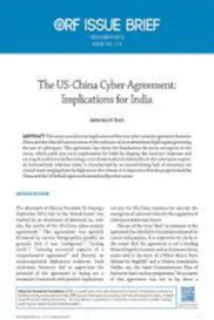The aftermath of Chinese President Xi Jinping’s September 2015 visit to the United States was marked by an abundance of discourse on, inter alia, the merits of the US-China cyber-security agreement. The agreement was quickly dismissed by various foreign-policy pundits on grounds that it was “ambiguous”, “lacking teeth”, “missing essential aspects of a comprehensive agreement” and thereby, an inconsequential diplomatic endeavor. Such criticisms, however, fail to appreciate the potential of the agreement in laying out a normative framework with positive implications not just for US-China relations but also for the emergence of universal rules for the regulation of cyberspace in the near future.
The use of the term “deal” in reference to the agreement has also led to misinterpretation of its nature and purpose. It is imperative to clarify at the outset that the agreement is not a binding bilateral legal instrument and, in its present form, exists only in the form of a White House Press Release (in English) and a Chinese translation. Unlike, say, the Joint Comprehensive Plan of Action on Iran’s nuclear programme, the purpose of this agreement was not to lay down a comprehensive set of rules for the regulation of state action in cyberspace. Expecting concrete rules to emerge at this heads of state summit imposes an unfair burden on both leaders. The agreement in itself is significant as it acknowledged the existence of certain issues by both states with regard to the use of cyberspace. It is certainly an attempt to work out the prospects that emerge with the establishment of this normative framework. This Brief will describe the salient features in the text of the agreement. It will then explain the significance of this agreement in terms of norm creation at the international level. Finally, it will explore what the emergence of this norm means for India by comparing it with its response to other international legal regimes.
The views expressed above belong to the author(s). ORF research and analyses now available on Telegram! Click here to access our curated content — blogs, longforms and interviews.

 PDF Download
PDF Download



 PREV
PREV


